https://fr.callie.com/blog/30-citations-droles-et-ironiques-sur-linsomnie
In the arms of Morpheus: Regulating sleep disorders with essential oils
Aromatherapy and the use of essential oils is an effective and natural method to improve the quality of sleep. In this article, we will review the different phases of sleep and the importance of restful rest. We will then discuss essential oils to promote the regulation of sleep disorders whose objective is better health and general well-being.
Sleep Phases
Sleep is a fundamental biological process that takes up about a third of our lives. It consists of several distinct phases, each of which plays a crucial role in our body's physical and mental recovery:
1) Non-REM sleep (rapid eye movements): Has 3 phases:
· • Phase 1: Slight transition between wakefulness and sleep
· • Phase 2: Deeper sleep where the body begins to relax
· • Phase 3: Deep sleep very important for physical recovery
2) REM (REM) sleep: It is characterized by rapid eye movements and intense brain activity, associated with dreams. This phase is essential for memory consolidation and emotional information processing.
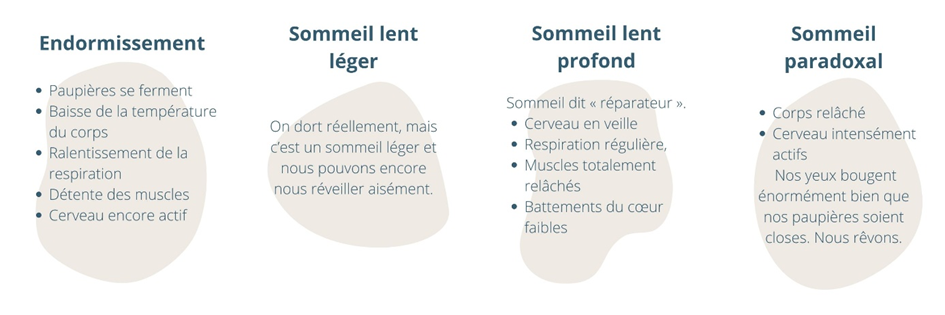
https://www.ponroy.com/conseils-sante/la-melatonine-et-les-cycles-de-sommeil
The role of hormones during the sleep cycle
Hormones play a crucial role in regulating sleep, influencing both its quality and duration. Here is an overview of the most important specific functions during sleep:
· • Melatonin: It is also called the "sleep hormone", it is produced by the pineal gland in response to darkness? It helps regulate the circadian rhythm, telling the body that it's time to sleep. It helps you fall asleep and helps maintain sleep throughout the night.
· • Cortisol: This is a stress hormone produced by the adrenal glands. Its level varies according to the circadian cycle, with peaks in the early morning. High levels of cortisol can disrupt sleep, especially in cases of chronic stress. Normally, it helps to wake up the body in the morning.
· • Growth hormone (GH): It is secreted by the pituitary gland, GH plays a vital role in growth, tissue repair and metabolism. Its maximum secretion during the phases of deep sleep. It contributes to cell recovery and regeneration
· • Adenosine: This is a neuromodulator that accumulates in the brain during wakefulness and is broken down during sleep. The accumulation of adenosine promotes drowsiness and makes it easier to fall asleep.
· • Ghrelin and leptin: It is produced by the stomach, stimulates appetite, while leptin, produced by fat cells, suppresses it. A lack of sleep increases ghrelin and decreases leptin, which can lead to increased appetite and metabolic disorders.
· • Prolactin: It is produced by the pituitary gland, it plays a role in the regulation of the immune system and lactation. Its levels increase during sleep, especially in deep sleep, thus promoting recovery and immune function
· • Insulin: It is secreted by the pancreas, it regulates glucose metabolism. Sleep influences insulin sensitivity; Poor, poor sleep can alter this sensitivity, contributing to metabolic disorders like type 2 diabetes.
The importance of sleep on health
Quality sleep is essential to maintain mental, emotional and physical balance. The benefits of good sleep include
· • Physical recovery: Sleep allows the body to repair and regenerate itself. Muscles relax, protein production increases, and tissues regenerate.
· • Cognitive function: Sleep plays a key role in memory, learning, and problem-solving.
· • Emotional regulation: Good sleep helps manage emotions and reduce stress and anxiety.
· • General health: Adequate sleep is linked to better immunity, balanced hormonal regulation and an efficient metabolism, especially with regard to cardiovascular diseases.
Thus, as you will have understood, the proper functioning of these hormones and their synchronization in the sleep-wake cycle are therefore essential for optimal recovery, effective metabolic regulation and general well-being. Hormonal disruptions, caused by factors such as stress, inadequate diet, or an irregular lifestyle, can severely impact sleep quality and overall health.
Regulating Sleep with Essential Oils
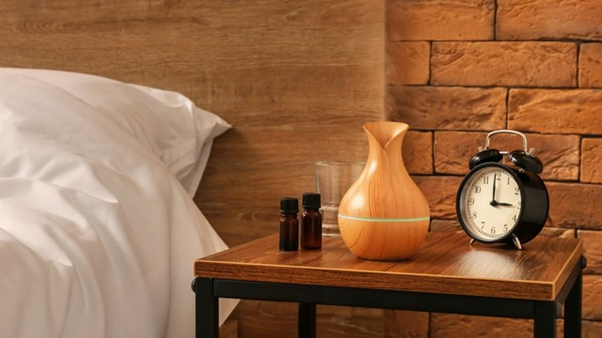
https://kumparan.com
Essential oils have an influence on the limbic system, the part of the brain that controls emotions and behavior, which can have a direct impact on sleep quality. (To learn more about this, a previous article explains in detail how olfactory works: "The power and influence of smells on our emotions and behaviors", do not hesitate to consult it).
True Lavender (Lavandula angustifolia): Known for its soothing, relaxing, calming properties, it helps reduce stress and anxiety and induces sleep

https://www.pharma-gdd.com
Roman Chamomile (Chamaemelum): It has soothing effects and helps to calm the mind and induce restful sleep. Its sedative and relaxing properties influence falling asleep, sleep quality and regulates insomnia. It is considered the "gold" in terms of sleep. It is advisable to start by using other essential oils before favoring Roman Chamomile or using it in a synergy

https://www.pharma-gdd.com
Garden marjoram (Origanum majorana): It calms the central nervous system (sedative, anxiolytic, antispasmodic), reduces stress and anxiety, it rebalances the nervous system which helps to calm the mind when it is agitated or polluted by incessant thoughts before sleeping.

https://www.pharma-gdd.com
Red Mandarin (Citrus reticulata): It has calming and soothing properties. Its slightly sedative effect makes it easier to fall asleep.

https://www.pharma-gdd.com
Ylang-Ylang (Cananga odorata): This essential oil is known to be quite relaxing, it helps reduce tension, acts against stress and anxiety. In addition, it is also anti-depressant helping to improve mood and induce a sense of well-being conducive to sleep.

https://i-sam.unimedias.fr
Atlas cedar (Cedrus atlantica): It has sedative properties, it acts on stress and anxiety, it promotes restful sleep

*It is wise to consult the precautions for use before using the essential oils, you can find them on this site.
Bibliography:
A. GEA. (2022), "Physiology and essential oils, How do essential oils act on the different systems of the body?". Ed. Dunod
BAYER, L. & Dr STAUB, H. (2013) "Traité approfondi de Phyto et Aromathérapie", Ed. Grancher.
FAUCON, M. (2019), "Treatise on Scientific and Medical Aromatherapy-Essential Oils", Ed Blood of the Earth
JOUVET, M. (2016). "Sleep, Consciousness and Wakefulness". Ed. Odile Jacob
SERGUEYEFF, S.J.N. (2023). "Sleep and the nervous system. Physiology of wakefulness and sleep". Ed. Hachette
STEVEN, L. (2015). "Such a Brilliant Brain: Borderline States of Consciousness". Ed. Odile Jacob
* The information written in this article by the MARCATI Workshop comes in particular from references from the scientific literature. It is transmitted and shared for information purposes only. They therefore do not claim to be a substitute for medical advice, diagnosis or any treatment.





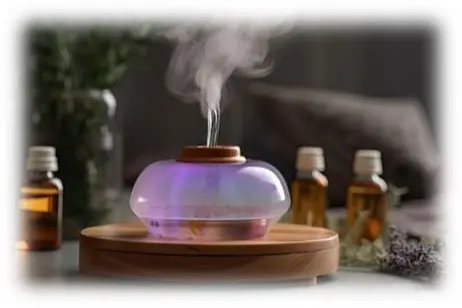
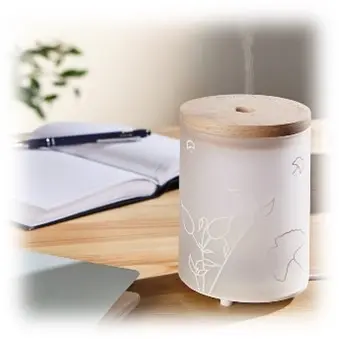







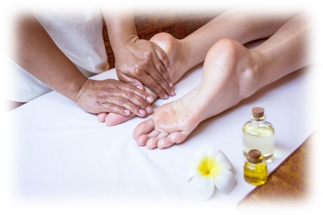


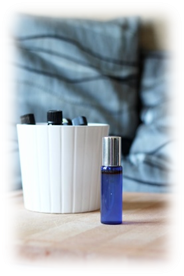

In the arms of Morpheus: Regulating sleep disorders with essential oils